Biola University welcomes 16 new faculty members this fall — each of whom represent the university’s aspiration to attract and retain the finest Christian scholars. The new professors — from School of Fine Arts and Communication, School of Science, Technology and Health, School of Humanities and Social Sciences, Cook School of Intercultural Studies, Crowell School of Business and Talbot School of Theology — vary in interest and expertise from molecular biology and international business to humanitarian organizations.
To learn about Biola’s new faculty, read their thoughts below on the value of Christian higher education and the significance of a strong foundation in their specific fields.
Cook School of Intercultural Studies
_half.jpg)
Lindsey Huang
Intercultural Studies
Lindsey Huang earned her doctorate in sociology at the University of North Texas with an emphasis in global and comparative studies and inequality. Her dissertation work examined the relationship between belief in the prosperity gospel and economic and social attitudes in Guatemala. Prior to her doctoral studies, Huang lived in Guatemala for four years where she worked with study abroad students and missionaries involved in community development. During this time she also pursued a Master of Arts in Biblical Studies at the Central American Theological Seminary in Guatemala City. Her thesis work utilized a mixed methods approach to evaluate short-term missions through the lens of integral mission. Before coming to Biola, Huang served as the sociology program director and assistant professor of sociology at Fresno Pacific University. Her current research interests include the effects of short-term missions on participants and host communities, and the dynamics of multinational missionary teams.
“Institutions of Christian higher education, like Biola, challenge students to ground themselves in their faith, while at the same time preparing them to wrestle with, and to respond to, the current philosophies, ideas, and paradigms of our society,” said Huang. “These institutions create a much needed space where followers of Jesus Christ engage in the difficult issues that confront our world, all while learning how to love God and our neighbor better.”
Crowell School of Business
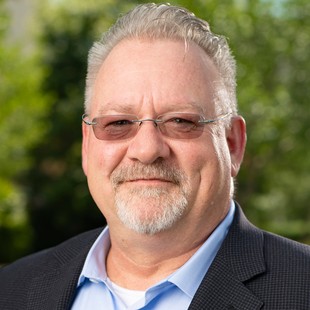
Randall Markley
Accounting and Finance
Randall Markley is an associate professor of accounting and finance at the Crowell School of Business. With a career in business spanning three decades, Markley has held several executive positions overseeing the financial, operational and business development for both public and private corporations. Markley received a Bachelor of Arts and Master of Business Administration from the University of La Verne. He also earned a Master of Public Administration from the University of Southern California and, in 2019, Markley graduated with his doctorate from the University of Florida’s Warrington College of Business. Markley’s research interest is on effective college teaching and learning methods with a focus on accounting and finance courses. He has also taught undergraduate and graduate accounting and finance courses at the Dr. Robert K. Jab’s School of Business, California Baptist University. Markley has been married to his wife for 30 years.
“Christian Colleges have a tremendous opportunity to positively influence the next generation of leaders. My desire, as a teacher, is to demonstrate and encourage the pursuit of quality and excellence in all academic endeavors as I believe this is also a Christian virtue. With the understanding that each student brings different perspectives and abilities to the classroom, I believe a Christian University should endeavor to help each student integrate real world challenges and opportunities with scholarly evidence based best-practices in the administration of a business or public enterprise. To this end, guiding each student to learn to analyze, evaluate and apply ethical decisions in addressing specific challenges and opportunities in managing a private, public, or non-profit organization is essential. In the world of business, ethical decision making is a primary concern. Often students are taught about ethics, but not how to behave ethically in an often unethical world. What students really need is to learn how to apply their understanding, assess, and deal with situations that will likely arise in their life and career and this is a primary focus for me as an educator.”
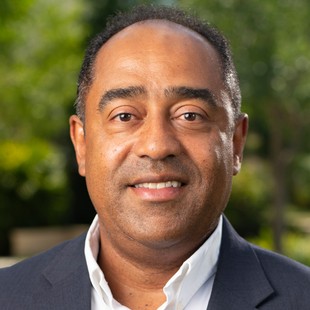
Wlamir Xavier
International Business and Finance
Wlamir Xavier is an associate professor of international business and finance at Biola University. His research focuses on the business group phenomenon in emerging countries, corporate governance, and non-marketing strategies. He has been a visiting scholar at the University of Paris Dauphine, the Wharton School, the Copenhagen Business School, the University of La Sabana in Colombia and Chongqing University in China. His experience includes a position at IBM as a brand manager, consulting, and business ownership of an IT firm focused on mobile computing for Sales Force and fleet automation. Xavier is the founder and vice president of the CW7 Group, a consulting firm that provides training on leadership and coaching to Christian churches. In addition to providing coaching to churches, Xavier serves as an elder at his home church.
“A strong Christian foundation in my field of study, international business, is an opportunity to spread and apply God’s word to the whole world and impact many peoples and cultures in a single lifetime,” said Xavier. “I consider a privilege to teach international business at a Christian University in one of the most globalized cities in the world, as I equip our students to use business as a platform to spread the Gospel.”
School of Fine Arts and Communication
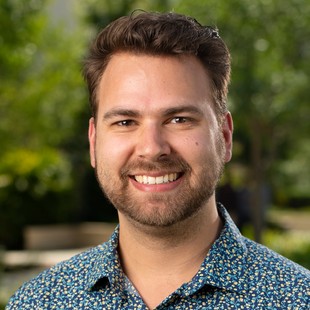
Joel Balzun
Conservatory of Music
Joel Balzun studied vocal performance at the Eastman School of Music, where he earned his master's degree under the tutelage of Jan Opalach and Benton Hess. He has augmented his studies as a fellow at the Tanglewood Music Centre — where he was primarily mentored by Sanford Sylvan — and Pittsburgh Festival Opera as a Featured Artist in the Young Professional Artists program, where he participated in Jane Eaglen's inaugural class of the Mastersingers Project for Young Dramatic Voices. From Carnegie Hall to the Kennedy Centre, Balzun’s expanding repertoire includes the title roles in Don Giovanni and Gianni Schicchi, “Marcello” and “Schaunard” (La bohème) the Four Villains in Les contes d'Hoffmann, “Prince Yeletskiy” and “Count Tomskiy” (Pikovaya Dama) and “Joseph De Rocher” (Dead Man Walking) with opera companies and orchestras across North America. Praised as “an already mature artist with a voluminous sound,” his acclaimed performance of Bach's Johannes-Passion with the Rochester Bach Festival was recently broadcast multiple times across the United States. He has been a prize-winner in the Metropolitan Opera National Council Auditions, Lyndon Woodside Oratorio-Solo Competition, Gwendolyn Roberts Young Artist Auditions, Orpheus National Vocal Competition and the Rio Hondo Symphony Young Artist Competition.
“Opera is a ‘godless’ realm and often feels vain; it also can feel idolatrous, mounting ourselves on a pedestal for the glory of applause and attention. The characters presented in opera are fallen people who have flaws I would never hope to encounter in real life. Having a strong Christian foundation in opera can be crucial in resetting and reorienting the purpose behind the performance,” said Balzun. “The question I ask with any role I prepare is: how can my character's actions point an audience toward God and knowing Him deeper? This takes me away from the end of the equation — I become a vessel for something that I cannot accomplish on my own.”
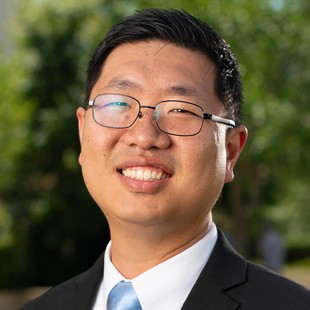
KiYong Kim
Journalism and Integrated Media
KiYong Kim is a seasoned public relations professional with expertise in humanitarian and faith-based organizations. As an international communications expert, he brings a global perspective developed through his experiences in places such as Hong Kong, South Korea, China, the Philippines, Australia, and the United States. As an advocate for the eradication of extreme poverty in his lifetime, Kim’s work with Compassion International helped over 20,000 children find sponsors. His experience included managing experiential events in churches, universities, and music festivals; launching a nation-wide fundraising campaign for the Korean-American market; and leading vision trips to Guatemala, the Philippines, and the Dominican Republic. As a subject matter expert in cross-cultural and international communication, he helped reimagine the communications and technology platforms for Compassion. At Ambassador Advertising Agency, Kim worked to expand the reach of faith-based organization's radio programs such as Mercy Ships, the Billy Graham Evangelical Association, Max Lucado's UpWords and the Life Issues Institute. Today, he provides digital branding and strategic communication consulting for start-ups and faith-based organizations. Kim is an Accredited Public Relations Professional (APR), who graduated with his Bachelor of Science in Business Administration from Biola University and earned his Master of Arts in Strategic Communication from Regent University.
“Effective and strategic Christian leadership in organizations is more critical today than it has ever been before. Studies have shown that ethically ambiguous practices have resulted in a 'crisis of trust,' leading to increased distrust in organizations, large and small. Robust and effective Christian higher education, therefore, is critical in the development of Christian public relations professionals who will serve organizations as ethical counselors, skillful communicators, expert prescribers and strategic planners,” said Kim. “In public relations, it's all about listening to one another and establishing trust and credibility so that we can build mutually beneficial relationships. Having a strong Christian foundation is essential in developing moral courage, ethical principles, and a trustworthy character needed for cultural flourishing and effectively engaging with our increasingly complicated, diverse and global community.”
School of Humanities and Social Sciences
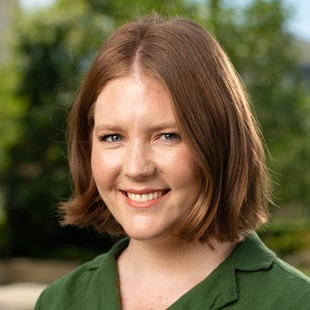
Paige Dinneny
English
Paige Dinneny is an alumna of Biola University’s english department. She graduated with a Bachelor of Arts in English and went on to receive her Master of Fine Arts from Cal State Long Beach, with an emphasis in fiction. During her time at Biola, she was awarded The William Shanebeck Award for Excellence in Writing; during her time at CSULB, she received the Isabelle McCaffrey Horn Memorial Scholarship. Most of her creative-work-in-progress engages with family dynamics, particularly relationships between mothers and daughters. She has spent the last two years teaching at Biola as an adjunct instructor in the English Writing Program and is excited to join the community in a full-time role.
“In my own experience, Christian education has served as the foundation not only for my time in the professional sphere, but in the personal as well. God is a storyteller. Our interaction with the written word, be that creative writing, professional communication, or God’s Word, is a gift,” said Dinneny. “The English department works alongside students to grow and cultivate that gift. I stand by and endorse the department’s mission 'to equip students to explore the complex narrative worlds of both literature and life that they might live out their callings more intelligently and compassionately from a scripturally sound perspective'.”
School of Science, Technology and Health
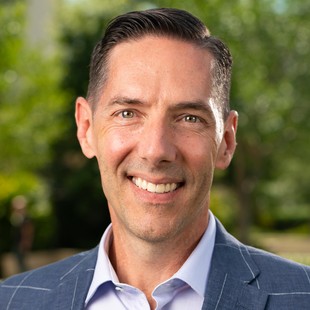
Doug Axe
Biology
Having spent a portion of his time as a visiting professor last year, Doug Axe has moved with his family from Seattle to join the Biola faculty as the Maxwell Professor of Molecular Biology. After finishing undergraduate studies in chemical engineering at U.C. Berkeley, Axe completed a doctorate in biochemical engineering at Caltech. Then, as a postdoctoral scientist at the University of Cambridge and a research scientist at the Medical Research Council Centre in Cambridge, he extended engineering principles to study the molecular design of life, focusing on enzymes and enzyme systems. His work and ideas have been featured in many scientific journals, including the Journal of Molecular Biology, the Proceedings of the National Academy of Sciences, and Nature, and in such books as Signature in the Cell and Darwin’s Doubt by Stephen Meyer and Life’s Solution by Simon Conway Morris. He is the founding Director of Biologic Institute, the founding editor of the peer-reviewed science journal BIO-Complexity, and the author of the award-winning book Undeniable—How Biology Confirms Our Intuition That Life Is Designed, where he shows that you don’t need to be an expert to see that science and faith are friends, not foes.
“Paul wrote in his first letter to the Corinthian church that the gospel message is foolishness to the world. Never has this been more true, and nowhere is it more obvious than in higher education, where nearly every field of study has come under the spell of atheistic, anti-Christian thinking,” said Axe. “For Christian colleges and universities, the constant temptation is to trade faithfulness for worldly esteem, and the number of institutions that have made this trade is sobering. At great cost, counterfeit gospels are being preached as if they had the power to save. The answer, of course, is the very message that has been abandoned by so many, and this is what makes faithful institutions like Biola so crucial. No work is more exciting than redemptive work, and for all the talk about making the world a better place, only gospel-centered institutions have the power to do that!”
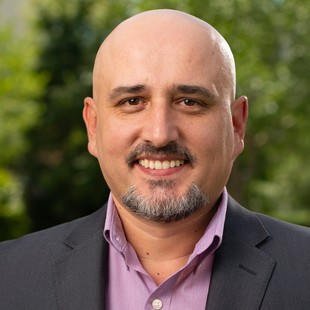
Gentian Buzi
Computer Science
Gentian Buzi will teach in the computer science program at Biola. He received his doctorate in control and dynamical systems from Caltech. After working as a postdoctoral scholar at Caltech and ETH Zurich, he accepted a position at SUNY Fredonia as assistant professor of Computer Science. His research interests are in the areas of Control Theory, Systems/Computational Biology, and Machine Learning. He holds a Bachelor of Science in Computer Science and Physics from SUNY Fredonia and a Master of Science in electrical engineering from Caltech.
“In higher education we are charged with helping shape our students’ thinking and understanding of the world and the people around them,” said Buzi. “The Bible teaches that Christ is the creator and sustainer of all things, both visible and invisible. It is therefore foolishness to try to complete this charge while dismissing this basic truth. Christian higher education has the responsibility and opportunity to prepare students for both their professional careers and more importantly life, by presenting them the complete picture, with Christ at the center.”
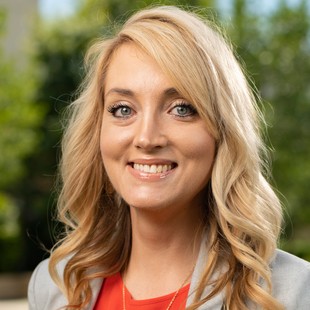
Danielle Walker
Health Science
Danielle Walker’s teaching experience and interests include global health, epidemiology, community health, public health education, HIV/AIDS, health promotion and disease prevention, health behavior, program evaluation, and ethics. She received her doctorate in interdisciplinary health sciences from the University of Texas at El Paso and was awarded the 2017-2018 Outstanding Dissertation Award for the UTEP College of Health Science. Walkers also holds a master of arts in organizational leadership with a focus on nonprofit management from Azusa Pacific University and a bachelor of science degree in Public Health from California State University Northridge. She finds joy in helping students identify their unique gifts and how to use them on a local and global scale. She has a passion to fight injustice, which guided her career in HIV care at CDC and as executive director of a nonprofit. Her current research is focused on increasing HIV knowledge and testing to optimize the HIV Continuum of Care in Davao, Philippines. Walker also has experience in HIV research in Africa, building statistical predictor models for HIV testing, and is exploring how public health models can improve community development in Mexico and Tanzania.
Walker and her husband are co-founders of Meeting TENTS, a nonprofit that exists to mobilize communities to thrive through empowering local leaders. They focus on merging public health and missions by partnering with global leaders, conducting formal community assessments, and using research methods to drive sustainable goals. Meeting TENTS helps provide avenues for individuals to go on strategic mission trips and use their unique gifts to make a difference around the world.
“The fields of public health and health science amaze me with how they link to faith so naturally. Public health models are at the core of my research, and when those are applied to global missions then unique avenues to serve the least, forgotten, and marginalized begin to emerge. Many Christians have a heart for missions, but allowing research and sound methodology guide international collaboration provides evidence-based strategy for sustainability,” said Walker. “We merge the heart of Jesus with sustainable solutions to help global communities thrive. Public health and health science give us valuable tools to be the hands and feet of Jesus to this world.”
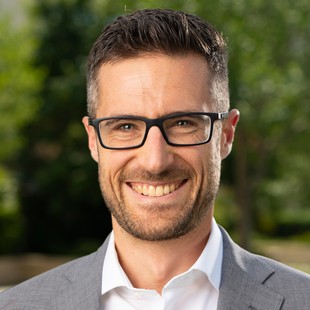
Justin Marks
Mathematics
After completing his Bachelor of Science in Mathematics at Westmont College, Justin Marks earned a Master of Science and doctorate in mathematics at Colorado State University. His dissertation was in the area of geometric data analysis, with emphasis on developing algorithms for computing mean representatives for a collection of points on a Riemannian manifold. Marks held four postdoctoral positions, including appointments with MIT Lincoln Laboratory, Air Force Institute of Technology, Bowdoin College, and Wesleyan University. He comes to Biola after serving three years as an assistant professor at Gonzaga University, during which he helped launch a bachelor of science degree in applied mathematics and taught for a semester in Florence, Italy. Marks’ current research interests center on designing matrix manifold algorithms to extract useful information from big data sets, such as images of human faces and hyperspectral imagery. A native of Palo Alto in the San Francisco Bay Area, Marks is delighted to have returned to sunny California.
“In this day and age, there is a heightened need for effective discipleship of the next generation. One of my favorite books is Kingdom Triangle, in which Talbot’s own J. P. Moreland posits that discipleship requires the cultivation of a strong mind, a healed heart, and a deep spiritual life in Christ Jesus,” said Marks. “Christian higher education considers and nurtures the intellect, emotions, and the spirit of each student. I am thankful that Biola embraces this holistic model for education and prepares students to truly change the world in Jesus' name.
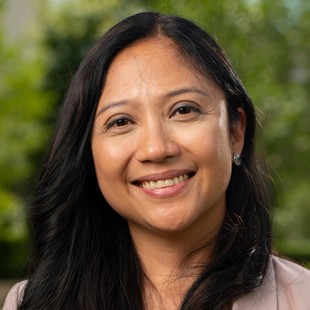
Ruby Loyola
Nursing
Ruby Loyola graduated with her Bachelor of Science in nursing from Biola University in 2005. She obtained her Master of Science in Nursing from California State University, Dominguez Hills in 2014 with an emphasis in gerontology as a Clinical Nurse Specialist. Loyola received her Acute Care Clinical Nurse Specialist — Adult-Gerontology — certification from the American Association of Critical Care Nurses. She has worked in an acute care hospital setting for 15 years and has grown professionally in various roles from Nurse Aide to Registered Nurse and Nurse Educator. In her most recent endeavor as the Stroke Program Coordinator, Loyola was instrumental in implementing evidence-based practice in stroke care for adults and older adults; leading to the joint commission accreditation of PIH Health Hospital - Downey as a Primary Stroke Center. She hopes to mentor and empower future generations of nurses to make a difference in the growing population of older adults.
“Healthcare today is rapidly changing and the field of nursing has been known to be a profession that is both in demand and demanding. I was blessed to have been given the opportunity to attend and graduate from Biola University. The impact of its Christian higher education and the positive influence of the faculty shaped my outlook on myself as a person and as a nurse,” said Loyola. “I have carried the lessons I've learned through the years that even with the ever-changing demands in the nursing profession (and life in general), my character and belief in Christ remains rooted in the foundations set by Biola. I believe that in order to become a catalyst of change in today's world, it starts with a strong Christian foundation - unwavering in the God's truth and filled with the fruit of the Holy Spirit.”
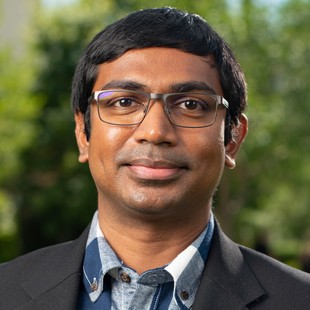
Don T. Galbadage
Public Health
Don Galbadage obtained his Bachelor of Science in Biology with minors in chemistry and mathematics from Texas Christian University in 2007, a Master of Public Health in epidemiology from the University of Texas, School of Public Health in 2008, and a doctorate in medical sciences from Texas A&M University, College of Medicine in 2017. He is a physician scientist by training with a research emphasis on molecular microbiology, addressing broader issues with antimicrobial resistance.
Galbadage’s teaching focuses on the disciplines of public health and health sciences. His areas of expertise are in epidemiology, biostatistics, disease control, preventative medicine, human physiology, pathology, microbiology, molecular biology, and wellness promotion.
His teaching strategies promote a student-centered learning environment based on four learning principles: core-competencies, personalization, student-ownership and versatility. Galbadage encourages active student learning by giving his students ownership of their learning experience. His mission as an instructor is to guide students through the process of meaningful learning and empower them to be independent lifelong learners. His goal in mentoring students is to invest in their lives, be an example of Christ-centered living and see them succeed in life.
“Higher education is an important foundation on which students build better careers and better lives. We live in a world where people constantly look for answers in every direction. They look to their leaders, education, social norms or social media. But the world does not have the answers they are looking for — Jesus does,” said Galbadage. “A Christian higher education is invaluable, as it brings a biblical basis to students’ education. This allows them to grow in their faith, walk with Jesus, and see the world from God's perspective. Christians are the light of the world. The Christ-centered education offered at Biola University prepares students to be future world changers that bring Jesus to the workplace, and shine their light. In doing so, they become ambassadors for Christ to the world, offering hope and answers that only Jesus can provide.”
Talbot School of Theology
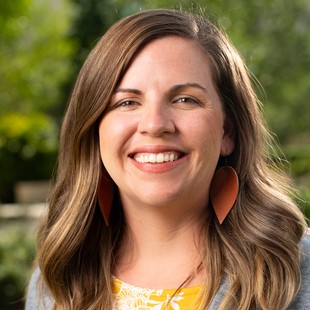
Berry Bishop
Institute for Spiritual Formation
Berry Bishop is joining the Talbot faculty this year, working at the Institute for Spiritual Formation. Bishop graduated from Talbot with a Master of Arts in Spiritual Formation and Soul Care, and then obtained her doctorate in psychology from Azusa Pacific University. Her primary research interest is in the area of trauma and spiritual direction. In addition to teaching, she continues to practice as a clinical psychologist. Bishop is married with a young daughter.
“Christian education enables individuals in the discovery and practice of truth, beauty, and goodness. These essential elements of truth, beauty, and goodness are why I became an educator,” said Bishop. “In being more open to truth, beauty, and goodness, I have seen others be more responsive to the calling of God. Between divine revelation and natural revelation, I firmly believe that God has given us the capacity to discover truth, even if it looks like testing theories, and that the Holy Spirit leads people into truth (John 16:13). Engaging relationally with students as a professor, mentor, and advisor, I see and taste God’s beauty. As educators spur students on in pursuits that are noble, pure, admirable, excellent, and praiseworthy, we engage in goodness (Psalm 23:6). There is potential for developing virtues in pursuing academia, and it is my hope to actuate that potential in students.”
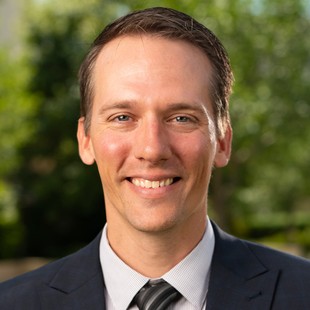
David Merrill
Institute for Spiritual Formation
David Merrill and his wife first joined the Biola community in 2006 when Merrill began as a Master of Divinity student and his wife took on an administration role at Talbot’s Institute for Spiritual Formation. During his time as a student, Merrill immersed himself in the academic and communal life of the campus taking on roles varying from adjunct faculty, staff spiritual director, and resident coordinator. Merrill earned his Master of Divinity in Spiritual Formation in 2010 and Master of Theology in 2012. In 2017, he completed his doctorate in theology at Durham University, in England. He still misses those beautiful crisp morning English countryside walks to his office every day. Merrill’s thesis dealt with the spiritual theology of Thomas Traherne; exploring how beauty and desire function as central components in his theological convictions and pastoral impulse. For the past two years he has been teaching spiritual formation courses for Talbot’s core curriculum. Most recently, Merrill has helped pastor a church in Paradise, California – Paradise Evangelical Free Church – as it navigates the aftermath of the recent devastating fires there and the ongoing call of God for that city.
“At first glance, it seems almost elementary the importance of my field of study – spiritual theology and formation – remaining deeply anchored in a strong Christian foundation, and maintain its place as a core tenant of any institution of Christian higher education. The latter must be true, for if not, the Christian institution loses its purpose of forming the spirits and characters of its students. The former is important – spiritual theology remaining anchored into a strong Christian foundation – for it combats two equal and opposite temptations. One temptation is the formation of a spiritual theology, and a subsequent spiritual life, based solely on pragmatism and “what works”, while remaining untethered from any Christian roots or Biblical theology that provides the distinctly Christian nature of those practices: praxis without grounding,” said Merrill. “Another temptation comes when we so emphasize Christian foundations in theology and Biblical exegesis, but fail to do the work to bring our theology into the life of experience: Christian foundations without grounding. My field of study seeks to bridge the theology-praxis divide for the sake of the Church.”
 Biola University
Biola University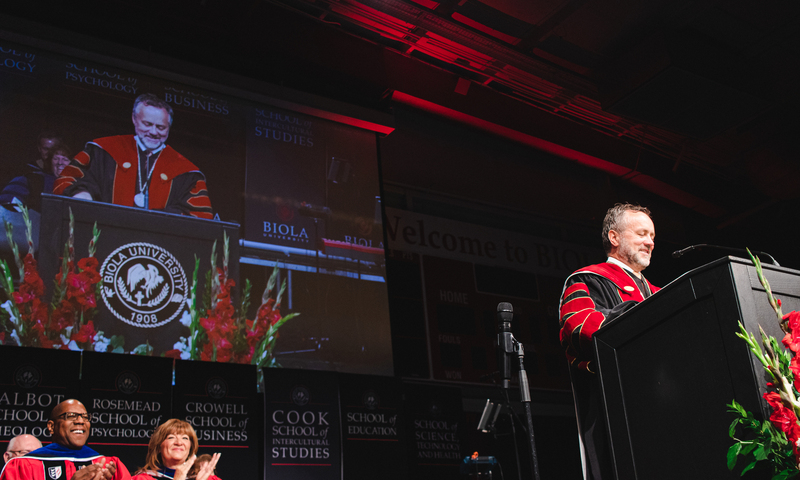
.jpg)
.jpg)